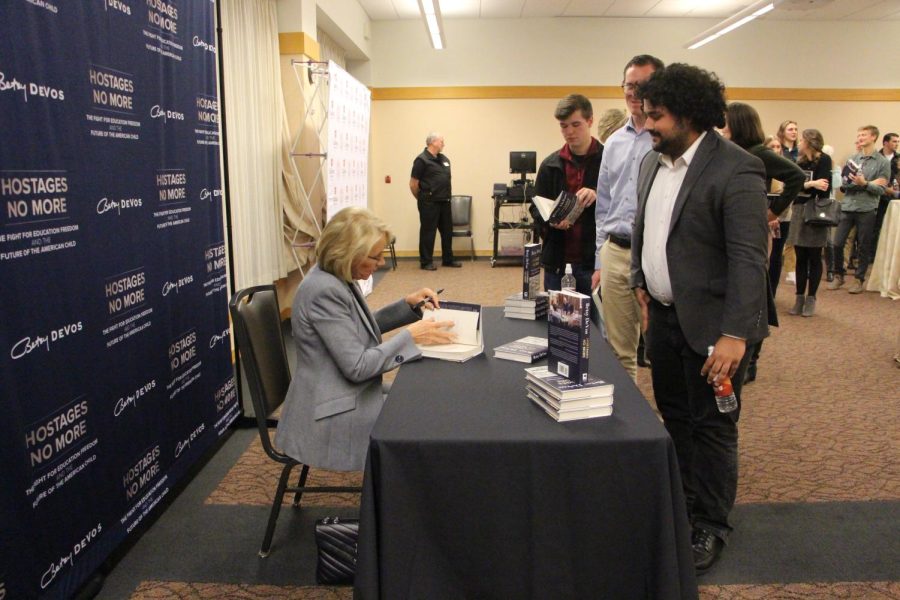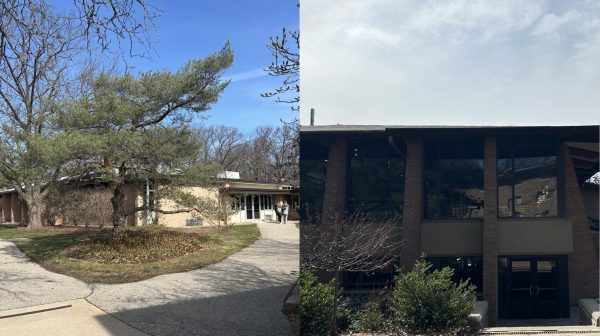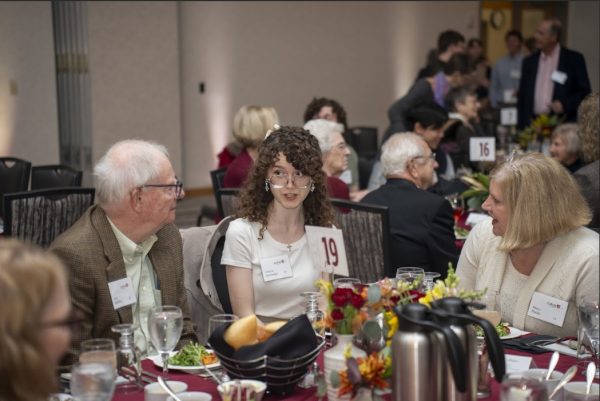Betsy DeVos visit spurs engagement, dialogue
Students said meeting DeVos gave them a more “three-dimensional” view of her, even though they didn’t change their mind on her policy.
Betsy DeVos, former Secretary of Education under the Trump administration, visited Calvin on Nov. 17 to promote her new book, “Hostages No More.” The event was sponsored by President Boer, the Henry Institute, the School of Education and the Calvin Alumni Association.
The event was intended to be a celebration and recognition of a successful alumna of the university, Brian Bolt, dean of the School of Education, told Chimes. However, DeVos’s political prominence and controversial policy goals provoked additional considerations.
Bolt reached out to DeVos when he first became dean — while she was still in office — because of her relationship to Calvin. “We have this connection, we should be working this connection,” he said.
The publication of her new book was a perfect opening for a visit, according to Bolt, and she agreed to speak. The date of the event — only a few days after Michigan’s midterm elections — prompted an intentional lack of publicity and exposure for the event.
“When we talked as leaders of this we were like, ‘we don’t want to look like this is political at all, because it’s not,’” Bolt said. Calvin didn’t publicize the event until after the election, which left only a week to promote it.
The date of the event was determined by DeVos’s team, according to Bolt.
DeVos is a controversial figure, partially because of her connection with the Trump administration, and partially because of her educational policy, according to Micah Watson, a political science professor.
DeVos’ educational policy is based on the idea of education freedom, which asks — and tries to answer — the question: “What options might there be to allow underprivileged families … to have some flexibility in terms of where their kids go [to school]?” Watson said.
Watson said this sometimes looks like vouchers or school choice, but it includes other options that provide resources and flexibility to parents for decision-making about their kids’ education.
DeVos’ educational freedom ideas have been a source of debate across the country, as well as on campus. To John Walcott, associate professor of education, the policies DeVos promotes seem harmful to the public education system.
“It’s easy to say ‘let’s let the money follow the student’ but we need to recognize it has an impact on public education,” Walcott said.
Florida’s voucher laws, for instance, will take 1.3 billion dollars away from public schools, Walcott said. “When funds are taken away from public schools … the communities that suffer the most are … primarily low-income communities, communities that have been traditionally underserved and historically excluded by our education system,” Walcott said.
In addition to concerns about equity, Walcott said there are many concerns about learning outcomes. He told Chimes that “studies show that places where there have been statewide voucher programs, [they] have had a negative impact on student learning.”
Public opinion across nearly all demographics is on the side of school choice. A survey conducted in 2019 by Beck Research on behalf of the American Federation for Children found that the concept of school choice was favored by 67% of people likely to vote in the Nov. 2020 election. Policies associated with school choice, like Education Savings Accounts (ESA), a federal scholarship tax credit and many others, are also widely supported.
Concerns about the kinds of schools that could potentially benefit from education freedom led Jordan Fridsma, a current freshman studying environmental studies, to organize a concurrent event outside the room where DeVos was speaking. Fridsma and a few other students gathered to advocate for LQBTQ+ students and their right to equitable education. “Many schools slated to receive funding through Devos’s plans are private schools that actively discriminate against students with LGBTQ+ parents or are LGBTQ+ themselves. It doesn’t feel right to financially support those kinds of educational environments,” Fridsma told Chimes.
While the attendees of Frisma’s gathering were not allowed into the public Q&A session, which required registration, they were able to ask DeVos a few questions afterward. “That really told me that she is a supporter of free speech,” Fridsma said.
Kelly Ruha and Jenna Hale, both juniors studying secondary education, attended a smaller Q&A session, intended to be classroom-like, alongside a group of around 20 other students studying political science or education.
“I think it was a really cool opportunity to speak to somebody who worked as the secretary of education,” Ruha said, although she was frustrated at the event formatting. The students asked questions, but even in the smaller group, they were unable to move past DeVos’s first answer. Ruha said a chance for conversation, or a student follow-up to DeVos’s answer “would have been an interesting way to see more of her policy.”
Hale told Chimes that meeting DeVos didn’t change her opinion on DeVos’s politics and policy, but it gave her a chance to see her in a more “three-dimensional” way. “She clearly believes what she’s saying is true and right and the best for students,” Hale said.
Despite her disappointment with the lack of opportunities for deeper dialogue with DeVos, Ruha said the event opened up interesting conversations with her fellow education students.
According to Bolt, the event provoked dialogue within the School of Education as well.
“Calvin supports private schools, Calvin supports public schools in all kinds of forms, charter and everything, and we have partners with all of them,” Bolt said. As a result, he feels it makes sense to have conversations about education freedom at Calvin.
Walcott said that the nature of DeVos’s Q&A event “didn’t lend itself to that give and take,” which he thought was appropriate, given its purpose. But the event “probably isn’t helping our students much if we don’t have the follow up to really dig in more deeply,” Walcott said, “The best benefit would be if we would take advantage of [DeVos’s visit] and use it to leverage a broader conversation.”
In the public Q&A event, Bolt told Chimes he asked DeVos what the best criticism of education freedom is. “I was a little disappointed that she said ‘well, I can’t think of any’ … that was a little disappointing, right, to try to get to that level of engagement and we didn’t.”
Ultimately, Bolt said, “I’m glad she came. … I think we can stomach some criticism to be an institution that engages ideas.”








Josh Boerman • Dec 6, 2022 at 12:43 pm
Absolutely pathetic stuff from new Pres. Boer, Prof. Bolt, and the administration. I watched most of the panel from the recording on YouTube. Factual errors abounded in her arguments, none of which were challenged. “Engaging ideas” implies that DeVos is interested in engaging in good faith, which is clearly not the case here. She’s a dogmatic propagandist who now is no longer even willing to full-throatedly condemn the Trump administration that she resigned from on a supposedly principled basis.
It seems clear to me when you follow the money that Pres. Boer arrived, took one look at the finances, and realized that the school needs more money to stay solvent. This meant going back to the trough to court the DeVos family and their billions. Personally I’ve gone from distaste to active outright revulsion toward my alma mater, and I know I’m not the only one. But then again, I don’t have a billion dollars, so Calvin probably doesn’t care about me anymore either.
Nate Stripp • Dec 5, 2022 at 8:17 am
Incredibly disappointing to hear Calvin giving what appears to be an uncritical platform to someone who was and is deeply harmful to the public education system. I appreciate the Chimes giving Walcott the space to respond fully but that should have been done at the event. Her wealth and proximity to an institution should not shield her from the need to defend her views, particularly as research repeatedly debunks their merit.